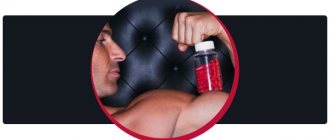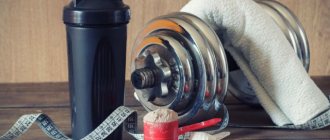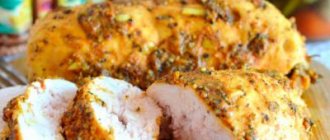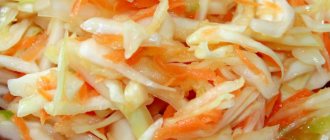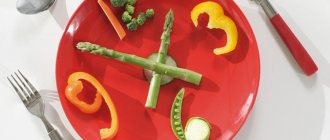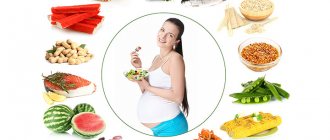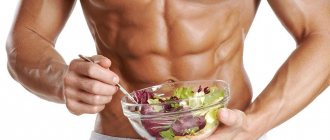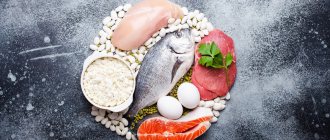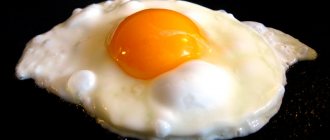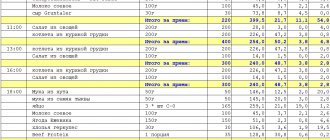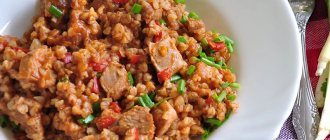The nutrition of athletes and ordinary people differs for a number of reasons. First: during active physical activity, an athlete consumes more energy than an ordinary office worker. Second: regular stress on the body, as well as individual performance indicators, force you to pay special attention to your diet. However, the basic requirements for the diet remain universal for everyone: food must be healthy and nutritious.
Dietary requirements for runners
Proper distribution of loads and further recovery plays a key role in the athlete’s progress and achievement of any results. The main key to recovery is good nutrition, which will replenish missing energy, supply the body with vitamins and a whole range of materials for muscle mass. A balanced diet for an athlete should perform a number of functions:
- Provide the body with calories, minerals, amino acids and other important microelements.
- Activate and regulate the metabolic process. A number of hormones and biologically active substances ensure normal metabolic processes.
- Control weight , since depending on the type of sport, as well as the stages of training, the athlete needs to exercise precise control of body weight.
- Change morphological parameters. This category includes the main transformations of the body during training - a decrease in fat deposits, an increase in muscle mass.
During loads, energy is consumed much faster, since in such circumstances vital organs work in an enhanced mode and more resources are required to maintain the basic functions of the body. A lack of useful microelements can lead to serious consequences, for example, exhaustion of the body, hence nervousness and fatigue. These are the reasons why nutrition is so important for athletes. A balanced diet, including natural products of natural origin, promotes good metabolism and replenishes energy costs. The body will work like a brand new engine in your car.
Vitamins for nutrition and sports
Proper nutrition when playing sports necessarily implies receiving a whole complex of all vitamins, nutrients and minerals. Ideally, of course, we should get all this from our diet, but if the season of the year does not allow us to eat a varied diet, then you can always add multivitamins to your diet. There are many good complexes that contain the necessary nutrients and minerals. First of all, pay attention to the content of vitamins A, B, E, C and D. Minerals must include potassium, calcium, phosphorus, iron, and magnesium. You can also consider the following options for nutritional supplements:
- Omega 3. Polyunsaturated fatty acids, which nutritionists definitely recommend including in your diet when losing weight.
- L-carnitine. This supplement helps quickly restore strength after exercise, reduces muscle pain and even suppresses hunger.
- Coenzyme Q10. Stimulates energy production and improves metabolic processes. In addition, this substance slows down the aging process.
Runners Diet
Selecting products and supplements, as well as developing a diet, should ideally be based on the individual characteristics of the body, the type of sport, and the level of stress. Yet, regardless of all these factors, an athlete’s food must contain a number of essential micro- and macroelements. In terms of the combination and quantity of components, the diet must correspond to the following parameters: 30% proteins, 60% carbohydrates, 10% fats . Do not forget about a number of irreplaceable amino acids and vitamins that can only be supplied to the body as part of certain foods or special sports supplements.
Cookies for health
Sports and sweets are not a hindrance to each other. If, of course, these are the right sweets made from National oat flakes. They are made from high-quality whole grains, preserving a maximum of vitamins and microelements. Oatmeal contains a lot of fiber, important for the body, and easily digestible minerals and vitamins. Soak 130 g of oatmeal in 80 ml of kefir. Rub 150 g of low-fat cottage cheese through a sieve. Mash a large banana with a fork. Beat the raw egg white into a fluffy foam. Combine all ingredients in a blender bowl, add 1 tbsp. l. honey and 0.5 tsp. cinnamon, a little raisins. Beat a homogeneous dough. Make round cookies and bake for 20 minutes in the oven at 180°C. It is quite acceptable to eat such a delicacy before your next workout.
As you can see, a sports menu for every day is simple, interesting and extremely useful. The main thing is to always have National brand products on hand. Thanks to the high quality and valuable nutritional properties that they are so rich in, a surge of vitality and an active mood are guaranteed to the body.
Squirrels
This is the most important component for an athlete. In the body, proteins are responsible for various indicators and are:
- Construction resource. Protein, which is the main component of protein, is responsible for the generation of various biological structures: ligaments, tendons, bone tissue and, of course, muscles.
- Catalyst. Proteins regulate metabolism and have a strong biochemical effect on the endocrine system and the body as a whole.
- Activator of metabolic and energy processes , which are influenced by enzyme particles of proteins.
- Engine of growth . As already mentioned, proteins are an integral component of the endocrine system and, specifically, growth hormones, which are so important for the athletic progress of an athlete.
- Transporters of trace elements . A number of proteins included in the original composition of the protein deliver oxygen, vitamins and other nutrients to all cells of the body.
- Immune protection . Antibodies that fight viruses and diseases include a large number of protein molecules.
The main sources of protein are: fish, meat, eggs and dairy products. In addition to proteins, they contain other microelements: fatty acids, vitamins and amino acids, such as methionine.
Dynamic salad
Phoenix Rice Mix National is an indispensable product for sports nutrition. It is a mixture of brown and red rice with the bran casings retained. It is in them that the main share of fiber, vitamins, minerals and calcium is concentrated. And rare red rice is a powerful antioxidant. This cocktail is a gift for those who train regularly. Boil 200 g of rice until al dente. Cut ripe avocado and radishes into slices, add salad mix and half a boiled egg. Separately mix 1 tbsp. l. linseed oil, 1 tsp. balsamic, lemon juice and grain mustard. Season the salad with sauce and add fresh berries - a light but nutritious fitness salad is ready!
Carbohydrates
Carbohydrates serve as the basis for energy metabolism and metabolic processes . During intense training and increased stress, carbohydrates are broken down especially quickly. Complex carbohydrates, which provide the body with energy for a longer period of time, are the basis of all nutrition for athletes. Foods high in complex carbohydrates: fruits, vegetables, rice, wheat, as well as a number of other natural grains. Products high in simple carbohydrates, that is, sugar: baked goods, sweets, carbonated drinks, etc. And, as you know, it is advisable for an athlete to limit the amount of sugar in his diet as much as possible. For example, it can be completely replaced with honey.
Content
- 1 Basic diets for young athletes
- 2 Establishment of diets for groups of sports 2.1 Establishment of diet indicators for group II of sports 2.1.1 Establishment of diet II-1 (calorie content 3000 kcal) - daily ration
- 2.1.2 Establishment of diet II-2 (calorie content 3500 kcal) - daily diet
- 2.1.3 Establishment of diet II-3 (calorie content 4000 kcal) - daily diet
- 2.2.1 Establishment of diet III-1 (calorie content 4000 kcal) - daily diet
- 2.3.1 Establishment of diet IV-1 (calorie content 5000 kcal) - daily ration
- 2.4.1 Table of interchangeability of some products
Fats
The second type of components, which is a supplier of energy and building microelements. Any cell membranes contain fats and should not be afraid of them. Fats, unlike carbohydrates, take much longer to break down. Often, these are energy-intensive and lengthy exercises, during which stable functioning of organs and correct temperature conditions are important. According to their origin, fats are divided into two types: animal and vegetable . Each of these groups performs specific functions, so their combination is important in the diet. The main source of vegetable fats is vegetable oil. Animal fats are found in butter and a number of fish varieties.
It is not always possible to get the required amount of proteins from ordinary foods, so some athletes use various natural supplements: amino acids, gainers, proteins. The nutrition of female athletes also has its own peculiarities. Their diet should contain an excess of plant fiber and monosaturated fats.
Differences in nutrition for girls and men
Women's physiology is different from men's. Nature has planned that expectant mothers need to protect the hip area, intended for bearing a child. Therefore, in girls, fat deposits grow faster and go away much more slowly.
Based on this, the weaker sex should train in the gym according to a pattern different from the male one.
As for the diet, discrepancies begin at the stage of the standard ratio of proteins, fats and carbohydrates that should be contained in the food consumed.
The proportions look like this:
| Men | Women | |
| Squirrels | 35% | 30% |
| Fats | 10% | 25% |
| Carbohydrates | 55% | 45% |
As can be seen from the table, the fair part of humanity, compared to the stronger sex, should have more fat and less carbohydrates in their diet.
You cannot completely give up fats. This can lead to hormonal imbalances affecting reproductive function. Therefore, fats (but only healthy ones) are an essential component when building muscle mass.
The female body, as already mentioned, is prone to the rapid formation of a fat layer. If you take a man and a woman of the same build, then He will use all the carbohydrates they eat to form tissues, and She will use only part of it, and put the rest on the sides. Therefore, girls should have 10% less of them on their menu.
In terms of proteins, a slight difference is associated with more intense tissue growth in strong athletes. The weaker sex does not grow muscles so quickly, and they do not need a large volumetric relief.
Menu for the day
Another important factor is the regimen: meals should ideally be at least every 3-3.5 hours. In general, the daily diet of a girl involved in sports may look something like this:
First breakfast: 150 gr. oatmeal, 2-3 eggs. Second breakfast: 400 ml. milk or kefir. Lunch: 150-200 gr. white meat or fish, 200-250 gr. rice or other porridge, vegetable salad. Afternoon snack: 150 gr. cottage cheese and a few nuts, fruit. Dinner: 150 gr. white meat or fish, vegetable salad or fruit. 2 hours before bedtime: 400 gr. fermented baked milk or other fermented milk product.
The menu for male athletes is developed according to the same principles, only taking into account different grams. The main factors for product compliance are simple: they must be natural and varied. A number of foods that should be maximally limited or excluded from the diet: sugar, table salt, powdered juices, spicy and fried foods, as well as alcohol. In terms of nutrition, balance must be maintained: you cannot overeat, as well as remain hungry. Constantly monitoring weight and listening to the body will help the athlete get the maximum benefit from nutrition.
PP dinner after training
Dinner after training is a separate topic of conversation. It’s good if you finish your classes not too late and can afford a full dinner, which will definitely include proteins and carbohydrates. What if you finish your workout late in the evening? Is it worth going to bed on an empty stomach, in the hope that this way the result will appear faster? Definitely not. You need to eat in any case so as not to force the body to experience stress. But a late dinner should be much lighter than a full dinner. Ideal options for a very late dinner:
- Natural yogurt
- Low-fat cottage cheese
- Fish or seafood
- Lean meat
- Protein shake with milk, water or kefir.
How to start PP for weight loss
What to feed your child if training is early in the morning
Early in the morning it is quite difficult to cram a full meal into your body. However, breakfast should be as nutritious as possible so that the workout does not exhaust the teenager and does not cause a strong feeling of hunger after exercise.
Despite the fact that an early breakfast should be nutritious, you should not overindulge in heavy food. When your teen starts exercising, he or she may experience a feeling of heaviness and nausea. You can eat heavily before training only 2-4 hours before it starts.
Examples of a nutritious early breakfast:
- smoothie made from cottage cheese, banana, yogurt, kiwi, honey;
- 1-2 glazed cheese curds with tea or cocoa;
- smoothies made from blueberries, raspberries, strawberries, bananas, yogurt;
- if the child does not eat porridge, oatmeal can be added to a delicious smoothie;
- a good nutritious chocolate covered cereal bar, banana;
- smoothies made from strawberries, cottage cheese, milk;
- tea with a sandwich of greens, tomatoes, lean meat, lean fish.
It is believed that a swimmer burns 4 times more calories compared to a runner who exercises at the same intensity.
What to eat before the competition?
Proper nutrition before competitions ensures a high level of anabolism.
10-12 days before the start of the competition, it is recommended to reduce the level of carbohydrates in the diet, and five days later gradually increase their amount.
Caloric intake before competitions and the amount of vitamins should be slightly reduced, based on personal data: weight, age, gender, metabolic characteristics. You can add dietary supplements to your diet with regular foods.
The morning before the competition should start with a carbohydrate breakfast: banana, muesli, porridge.
Fluid during exercise
If a teenage swimmer's body becomes dehydrated, he will experience cramps, headaches, and the child will feel tired.
Water regime during training:
- Be sure to drink water 1 hour before the start of classes. Volume 1 glass, i.e. 200-300 ml.
- Right before warming up, you are allowed to take 1-2 sips of water.
- If the workout is long, then during breaks you can take no more than 2-4 sips. Otherwise, water will gurgle in your stomach.
- After training, you need to wait 10 minutes until your pulse and breathing recover. Then drink as much liquid as your body requires.
A teenager can drink not only water, but also diluted juices, weak tea, and isotonic drinks.
Recovery and muscle building
During recovery, it is important to include a good amount of protein and carbohydrates in your diet. If a swimmer trains regularly, he needs active recovery of the body. To replenish energy costs, you need to consume at least 10 g of carbohydrates per 1 kg of weight.
Proteins restore and build muscles, saturate the blood with red cells, and strengthen the immune system. The body uses protein for energy only when there are not enough carbohydrates and fats for this purpose, which sometimes happens during training.
Good options for carbohydrate-protein recovery would be:
- cottage cheese with yogurt and honey. Cottage cheese contains casein, which saturates the muscles with essential amino acids for a long time;
- spinach and greens contain magnesium, which is responsible for the restoration of muscles, heart, and nerve cells;
- fish rich in fatty acids and creatine helps build muscle, the main thing is not to eat too salty fish, it will harm the body’s metabolic processes;
- cheese contains calcium and phosphorus, which restores not only muscles, but also bones.
Expert commentary
Alexandra Puriga
Candidate of Medical Sciences, sports doctor, rehabilitation specialist, well-being expert. Author of “The First Adequate Public” on Instagram.
Children athletes need to systematically take zinc, which promotes muscle growth and recovery after exercise, as well as maintaining skin that is susceptible to the aggressive effects of pool chemicals. Vitamins B1, B2, B5, B6, PP - are involved in the formation of the energy source ATP in muscles.
Diet for an athlete for a week
We offer you a diet that you can maintain for a week.
Monday
Breakfast - a hard-boiled or soft-boiled egg, a piece of black bread, two apples, a glass of tea.
Lunch - chicken broth, into which you can crumble a boiled egg. 200 grams of boiled meat, 3 pieces of boiled potatoes, seasoned with vegetable oil or mayonnaise. Compote or tea.
Dinner - boiled rice, a piece of boiled fish. Fish can also be steamed. Cucumber and tomato salad seasoned with vegetable oil. A glass of tea. At night you need to drink a glass of kefir.
Tuesday
Breakfast - any milk porridge, no need to add butter. Instead of sugar, you can add liquid jam to the porridge. One orange or any juice.
Lunch - chicken-based vegetable soup, which includes carrots, sorrel, onions, parsley. As a second dish, boiled beans with a piece of boiled chicken will suit you. You can wash everything down with compote.
Dinner - baked potatoes on a layer of salt, stewed beef liver, cabbage salad. Compote is suitable for the third.
Wednesday
This day will be a fasting day for you and me. You will have to drink kefir all day.
Thursday
Breakfast - two fried eggs, a piece of black bread, three medium apples, a glass of tea.
Lunch - beef broth with chopped potatoes and seasoned with sour cream. Boiled fish with rice porridge on water. Beet salad dressed with mayonnaise.
Dinner - stewed meat with vegetables, cabbage and carrot salad, a glass of kefir and a piece of cheese.
Friday
Breakfast - boiled potatoes with pieces of zucchini. Half a glass of sour cream, a piece of black bread.
Lunch - potato soup with garlic. Buckwheat porridge with stewed liver. Jerusalem artichoke or daikon (white radish) salad with sour cream. One banana.
Dinner - boiled beans or peas with fish cutlets or steamed meatballs. Cucumber salad. Kefir for the night.
Saturday
Breakfast - two soft-boiled or hard-boiled eggs with fresh cucumber, one orange.
Lunch - chicken soup, jacket potatoes, cut and seasoned with vegetable oil. Fish baked in the oven on a layer of salt. Sauerkraut salad. Tea.
Dinner - buckwheat or pearl barley with boiled chicken. Pour sour cream sauce over everything. Cabbage salad and finely chopped fresh cucumber. One apple.
Sunday
Breakfast - milk porridge made from rice, millet or wheat cereals, seasoned with jam. One soft-boiled egg, cheese sandwich. A glass of tea.
Lunch - pea soup with beef broth. Boiled noodles with fish. Beetroot and pickled cucumber salad dressed with mayonnaise. A glass of compote or juice.
Dinner - a glass of kefir. After 1 hour, repeat the kefir.
This diet is an example of proper nutrition for a person involved in sports. You can add some dishes to the proposed diet yourself, avoiding only fried, spicy and starchy foods.
Food after swimming
It’s better not to eat immediately after training))
To restore nutrient reserves in the muscles and liver and increase the level of immunity, half an hour after the end of training you need to eat a portion of simple carbohydrates , since muscles need glycogen.
A chocolate or carbohydrate bar, nuts, muesli, a bun, a sandwich, fresh or dried fruit are suitable for this.
If the break between classes is shorter than 8 hours, then you restore strength by eating protein foods, protein shakes, and optimally, proteins with carbohydrates.
